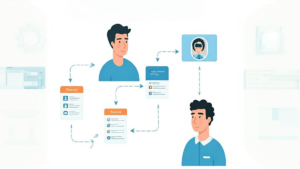
Today, the use of CRM systems (Customer Relationship Management) has become essential for businesses. Not only do they allow companies to efficiently manage customer relationships, but they also help personalize communications, improve sales, and offer better service.
However, with the growth of CRM usage, new challenges have also emerged, and one of the most important is how to minimize the security risks associated with managing large amounts of sensitive data.
In this blog, I will explain why it is crucial to protect the information you store in your CRM and how you can implement effective strategies to minimize security risks.
The Importance of Security in Your CRM
The CRM is the heart of your company when it comes to managing key customer information, such as names, email addresses, phone numbers, purchase histories, and financial data. All this information is valuable not only to your business but also to potential attackers. If proper measures are not taken to protect this data, you could face serious problems such as data theft, loss of customer trust, and legal penalties.
A 2023 IBM report revealed that the average cost of a data breach is approximately $4.45 million. And while we often think this only happens to large companies, small and medium-sized businesses are also at risk. Therefore, minimizing security risks in your CRM should be a top priority from day one.
Strategies to Minimize Security Risks in Your CRM
Fortunately, there are several strategies you can implement to protect the information stored in your CRM. Below, I present some of the most important ones.
1. Multi-Factor Authentication (MFA)
One of the most effective ways to minimize security risks in your CRM is by implementing multifactor authentication (MFA). This security measure adds an extra layer of protection by requiring users not only to enter their password but also to verify their identity using a second method, such as a code sent to their mobile phone or a biometric scan.
Multifactor authentication significantly reduces the likelihood of unauthorized access to your CRM, even if someone manages to steal a password. According to a Microsoft report, 99.9% of cyberattacks on accounts can be prevented with MFA.
This measure is relatively easy to implement and provides a great level of protection to prevent unwanted access.
2. Access Control and Permissions
Not everyone in your company needs access to all the information within your CRM. For this reason, one of the best practices to minimize security risks is to control who can access certain data and functions.
Establishing specific permissions for each user is essential. For example, your sales team should only be able to view the data relevant to their daily work, while the finance department may need access to more sensitive financial information. This segmentation reduces the risk of someone accessing information they should not handle.
By limiting data access based on specific roles within the company, you reduce the risk of an employee with less security training accidentally accessing sensitive information. Fewer access points mean fewer vulnerabilities.
3. Data Encryption
Encryption is a technique that converts data into a format that is unreadable to unauthorized individuals. When data is encrypted, even if someone manages to intercept it, they will not be able to read or use it.
Ensure that the data you handle in your CRM is encrypted both when stored and when transmitted. End-to-end encryption ensures that data is protected at all stages, from the moment it is sent until it is received.
Additionally, it’s important to ensure that the CRM providers you use also offer encryption as part of their services. Data protection is not only an internal responsibility but also that of your providers.
4. Staff Security Training
No matter how many technical security measures you implement, if your team is not properly trained, issues may arise. Human error is one of the main causes of data breaches, and often these errors occur due to a lack of knowledge.
Regularly training your team on good security practices is an excellent way to minimize risks in your CRM. Ensure that everyone understands the importance of maintaining strong passwords, recognizing phishing attempts, and immediately reporting any suspicious activity.
A 2023 Verizon report revealed that 82% of data breaches involved some form of human error. With proper training, you can significantly reduce these risks.
5. Perform Data Backups
Losing access to your CRM is not only a security issue, but also an operational problem that can cause significant business disruptions. Therefore, performing regular backups of your CRM is essential. This ensures that, even if a security incident occurs, such as a ransomware attack or a technical failure, you can restore the information without major setbacks.
Backups should be automated and stored in a secure location, ideally in the cloud with robust security systems. Recovering data quickly in case of a loss is key to reducing the impact of an attack.
6. Keep your CRM Updated
Cybercriminals are always looking for vulnerabilities in systems to exploit. That’s why it’s crucial to keep your CRM updated. Software providers release periodic updates that fix security flaws and enhance the overall protection of the system.
Not regularly updating your CRM leaves the door open to possible attacks. Ensure that all security updates are installed as soon as they are available, and maintain a strict system maintenance policy.
7. Continuous Monitoring and Auditing
Finally, one of the most important strategies for minimizing security risks in your CRM is constant monitoring. Implementing auditing and monitoring tools will allow you to identify any unusual activity in your CRM. These tools can alert you if someone tries to access data without authorization or if suspicious changes are being made in the database.
Monitoring gives you the ability to act quickly if you detect a security breach, limiting the damage and protecting the information before it’s too late.
The Benefits of Minimizing Security Risks in your CRM
Implementing all these security measures not only helps you protect your clients’ information but also generates a series of benefits for your business.
1. Greater Customer Trust
When customers trust that their information is secure with you, they are more likely to continue doing business with your company. Data protection is not only a legal obligation but also a competitive advantage. By demonstrating that you take the security of their data seriously, you are building stronger and long-lasting relationships with your customers.
2. Regulatory Compliance
Protecting customer data is not only a good practice but also a legal requirement in many regions. Regulations such as GDPR in Europe and CCPA in California require companies to handle data in a responsible and secure manner. By implementing these strategies, you are ensuring compliance with these regulations, avoiding fines and costly penalties.
3. Avoid Financial Losses
Cyberattacks can be costly. Besides the direct financial impact, such as paying ransoms or losing customers, they can also generate indirect costs, like repairing damage and productivity loss. Minimizing security risks in your CRM helps avoid these unexpected costs and keeps your focus on growing your business.
Conclusion
A CRM is a powerful tool for managing customer relationships, but it also involves handling large amounts of sensitive data. Minimizing security risks in your CRM is essential to protect both your customer information and the stability of your business.
By implementing strategies such as multifactor authentication, access control, encryption, and training your team, you will be taking concrete steps to protect your CRM and ensure that all the information you manage is secure. Remember, security is not something you do once and forget; it is a continuous process that must always evolve to stay updated with new threats.
If you follow these steps, you will not only protect your company from potential threats but also gain the trust of your customers, one of the best investments you can make in the growth of your business.






No comment yet, add your voice below!